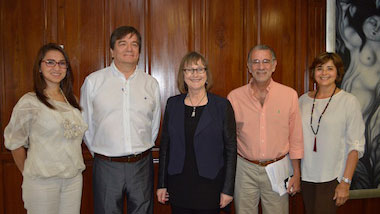
Early Childhood Care Model Replicated in Colombia
22 Jan 2016 By Keith McGuffey
A model of early childhood care by Dr. Helen Raikes and grad student Elsa Escalante are being replicated at the Colombian Family Welfare Institute.
The directory of the institute says that the research done by UNL is helping to fix the flaws were preventing the full development of education in early childhood in Colombia.
The original story can be found at http://www.atlantico.gov.co/index.php/publicaciones/noticias-educacion-10321/6430-gobernador-verano-trabaja-en-mejorar-el-modelo-de-educacion-en-primera-infancia. An English translation from the site is available below.
Enriching, called the governor of the Atlantic, Eduardo Verano de la Rosa, his meeting with the researcher at the University of Nebraska Helen Raikes; and the regional director of the Colombian Family Welfare Institute (ICBF), Hector Silvera, to analyze the model of early childhood care that is used in this area of the United States and see how you can articulate to the Department's program.
Verano de la Rosa for these experiences help strengthen the integral development of the human being, articulating the education component of culture, health and sports
In this breakfast meeting, held at the University of the North, he was also attended by Secretary of Education of the Atlantic, Dagoberto Barraza, who said that there are programs in the Department not far from what is being done in Nebraska, but yet to refine some details that could help find better results.
Summer governor explained that thanks to research done by the University of Nebraska has managed to find the flaws that were preventing the full development of education in early childhood. He noted that when the solutions suggested that the study managed to close the gap and now have developed an efficient model.
"They direct hits on homes and beat differences in language, this because it is a state with a large number of immigrants and had children who do not speak English and others who had different accent which negatively impacted on their processes learning, "said De la Rosa Summer.
He also said that the model used in Nebraska has two stages: one that goes from 0 to 3 years is extremely important because at this time it is when a child's brain is formed.
"The other phase is 3 to 5 years is when you end up forming his brains, that is, the child at age 6 will have the brain for life so we have to do well in feeding, encourage and them in places where the emotional part, closeness with their parents and their environment is helpful and full of positive elements that will serve them, "said the governor of the Atlantic.
He noted that the Department can apply these processes and impact on children's education. He said one of the discussions within the work table was the issue of resources; however, he said that this is not an issue because the Atlantic account with them and also have programs directed to this area of education. What they do not have is with interdisciplinarity that these plans should have to give best results.
"We vaccination programs in health, but are not connected with the sporting and cultural issue. If we have the same design and the same research to tell us what are the incentives that we give them, surely we arrive to close the gaps in early childhood education. "
Education Secretary said that any type of research must take into account the cultural side, so to do in the Atlantic should take into account the customs and adaptation to the environment, since they will affect the results obtained.
"Very probably the most important aspects will be taken into account in our model to improve early childhood care in cognitive, and affective and the educational component," said Dagoberto Barraza.
He said the first thing you should do is to structure what is in the Department and see how it fits with the ICBF and care programs in early childhood nationwide.
Child, Youth and Family Studies